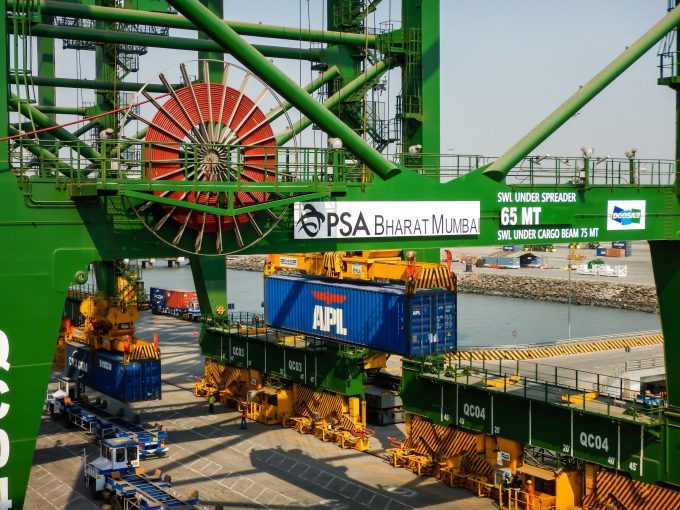Control of Wilson Sons could boost MSC dominance in Brazil
MSC’s acquisition of Brazilian operator Wilson Sons has raised eyebrows among forwarders in the region, ...
GM: RAISING THE ROOF GGM: IN FULL THROTTLE GZIM: MAERSK BOOST KNIN: READ-ACROSSMAERSK: NOT ENOUGHMAERSK: GUIDANCE UPGRADEZIM: ROLLERCOASTERCAT: HEAVY DUTYMAERSK: CATCHING UP PG: DESTOCKING PATTERNSPG: HEALTH CHECKWTC: THE FALLGXO: DEFENSIVE FWRD: RALLYING ON TAKEOVER TALKODFL: STEADY YIELDVW: NEW MODEL NEEDEDWTC: TAKING PROFIT
GM: RAISING THE ROOF GGM: IN FULL THROTTLE GZIM: MAERSK BOOST KNIN: READ-ACROSSMAERSK: NOT ENOUGHMAERSK: GUIDANCE UPGRADEZIM: ROLLERCOASTERCAT: HEAVY DUTYMAERSK: CATCHING UP PG: DESTOCKING PATTERNSPG: HEALTH CHECKWTC: THE FALLGXO: DEFENSIVE FWRD: RALLYING ON TAKEOVER TALKODFL: STEADY YIELDVW: NEW MODEL NEEDEDWTC: TAKING PROFIT

In a significant move that could reinvigorate the modal freight shift from land to sea, PSA International’s Bharat Mumbai Container Terminals (BMCT) in India’s Jawaharlal Nehru Port Authority (JNPA)/Nhava Sheva has started to use barges to transport containers from Goa, which usually feeds cargo to Sri Lanka’s Colombo Port.
The sea-route connection began with the MV Hope Seven – a barge owned by Hansa Shipping – which berthed at BMCT on Thursday.
“The weekly service between Goa and PSA Mumbai shall benefit the trade and facilitate exim [export-import] movement from/to Goa globally, thus amplifying transhipment volumes at JNPA,” the Singapore-based terminal operator said.
According to PSA Mumbai sources, the container-on barge service is a more competitive and faster option than trucking, as it can carry up to 200 boxes on a single trip with a two-day transit time, versus three days by road.
“At present, the barge mode has been designed to connect weekly sailings offered by CMA CGM and HMM at BMCT,” an official told The Loadstar. “The first lot of export cargo was pre-booked for loading onto the EPIC3 – a joint ocean service between CMA CGM and Cosco Shipping on the India-Europe trade – and the China-India Express (CIX), a weekly loop independently operated by HMM.”
According to estimates, Goa shippers have an opportunity to save about $500 per container on inland costs by shifting truckloads to barges, which will also help remedy growing congestion on highway networks connecting to the port and city points in the long run.
Last year, JNPA opened a dedicated coastal berth to encourage sea-based alternative logistics solutions for local cargo distribution and transhipment movement.
“The construction of the dedicated berth is in tune with the government’s policy to promote coastal shipping to shift freight from road to an environmentally-friendly and cost-effective mode of transport,” the port said. “The coastal berth will aid the smooth and faster coastal movement of cargo through a green channel.”
According to data released by JNPT, barge transport could allow cargo owners to save approximately Rs6,000 ($78) per box on inland costs and help the port eliminate about 17,500 truck trips annually.
Indian hinterland shippers, moving cargo by truck in the absence of other reliable options, are facing soaring haulage rates amid record-high diesel prices and the impact of new toll rates.
Truckloads represented 81.3% of JNPA’s volume last month, which underscores the importance of alternative solutions for quicker cargo turnarounds.
PSA Mumbai/BMCT saw significant volume growth last fiscal year (2021-22) – up 33% year on year, to 1.24m teu. Last month, the company began construction of a 2.4m teu capacity expansion as part of its Phase II development programme, aiming to commission in April 2025.
The barge-enabled alternative move comes as transhipment connections over Colombo are seeing heightened challenges for Indian shippers, a crisis unlikely to improve or normalise any time soon.
Comment on this article